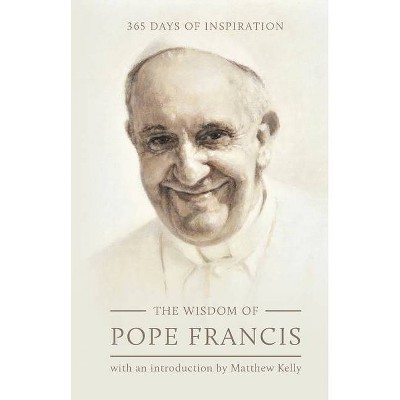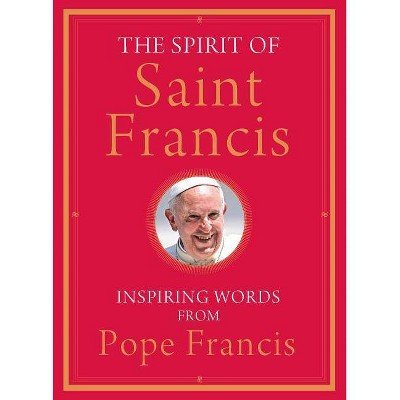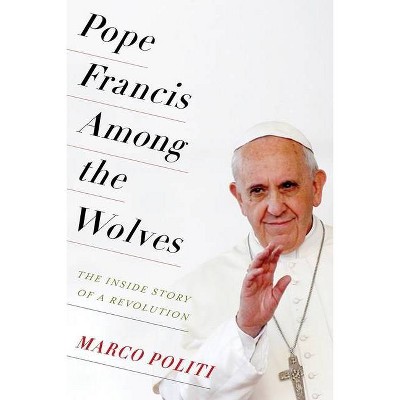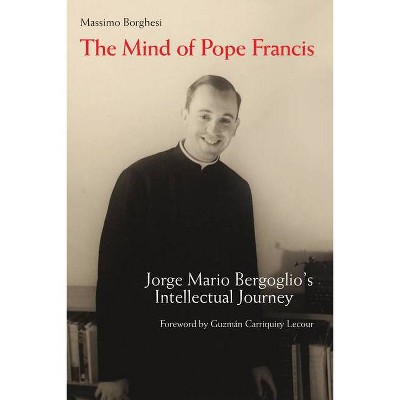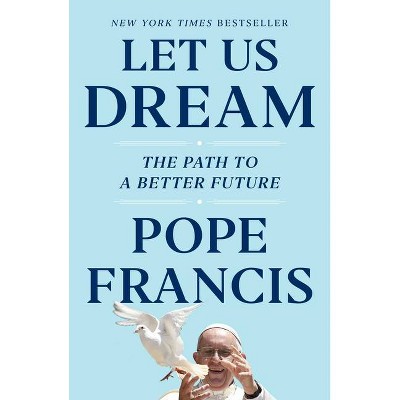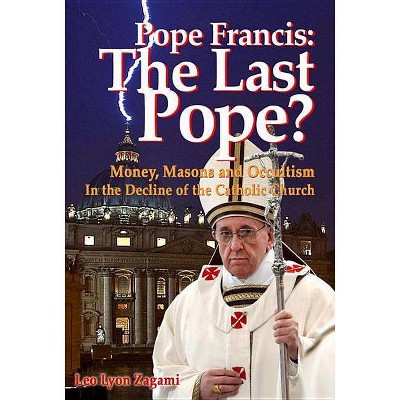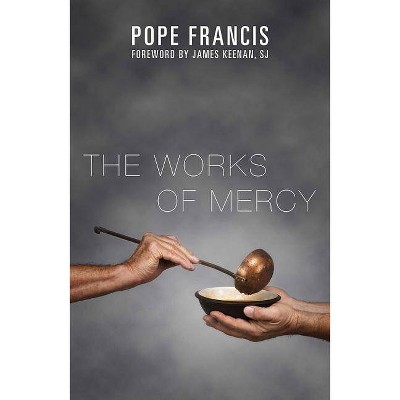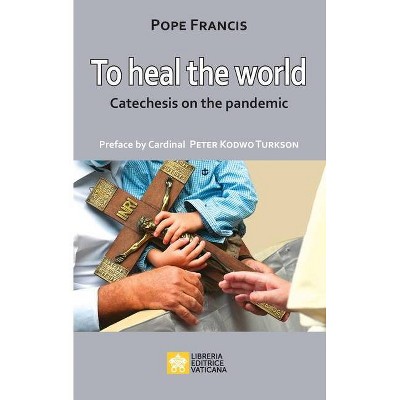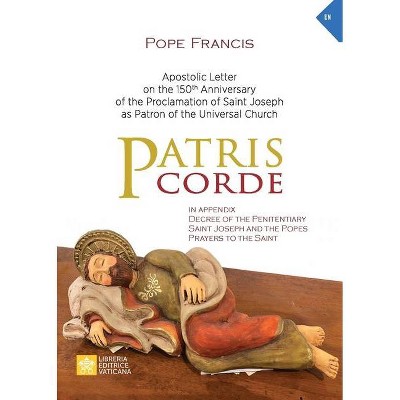The Name of God Is Mercy (Translation) (Hardcover) (Pope Francis)
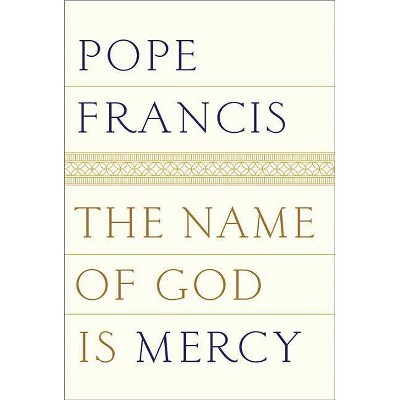
Similar Products
Products of same category from the store
AllProduct info
<p/><br></br><p><b> Book Synopsis </b></p></br></br> <i><b>NEW YORK TIMES </b></i><b>BESTSELLER - </b>In his first book published as Pope, and in conjunction with the Extraordinary Jubilee of Mercy, Pope Francis here invites all humanity to an intimate and personal dialogue on the subject closest to his heart--mercy--which has long been the cornerstone of his faith and is now the central teaching of his papacy. <p/> In this conversation with Vatican reporter Andrea Tornielli, Francis explains--through memories from his youth and moving anecdotes from his experiences as a pastor--why "mercy is the first attribute of God." God "does not want anyone to be lost. His mercy is infinitely greater than our sins," he writes. As well, the Church cannot close the door on anyone, Francis asserts--on the contrary, its duty is to go out into the world to find its way into the consciousness of people so that they can assume responsibility for, and move away from, the bad things they have done. <p/> The first Jesuit and the first South American to be elected Bishop of Rome, Pope Francis has traveled around the world spreading God's message of mercy to the largest crowds in papal history. Clear and profound, <i>The Name of God Is Mercy</i> resonates with this desire to reach all those who are looking for meaning in life, a road to peace and reconciliation, and the healing of physical and spiritual wounds. It is being published in more than eighty countries around the world. <p/> <i>"The name of God is mercy. There are no situations we cannot get out of, we are not condemned to sink into quicksand."--Pope Francis</i> <p/><b>Praise for <i>The Name of God Is Mercy</i></b> <p/> "Francis speaks succinctly--and with refreshing forthrightness. . . . He emphasizes moral sincerity over dogma, an understanding of the complexities of the world and individual experience over rigid doctrine. . . . The pope has an easy conversational style that moves effortlessly between folksy sayings and erudite allusions, between common-sense logic and impassioned philosophical insights."<b>--Michiko Kakutani, <i>The New York Times</i></b> <p/>"What makes his book most moving is the way in which this man, without disrespecting his own privacy or offering false bromides of modesty, opens the sacred space of his conscience to explain how he came to center his ministry, and now his papacy, around mercy."<b>--James Carroll, <i>The New Yorker</i></b> <p/>"As he has done throughout his papacy, Pope Francis shows in this book a compelling way to present God's love anew to a skeptical world without denying the ancient teachings of faith. But now he is challenging the entire Church to trek a new way forward."<b>--<i>Time</i></b> <p/> "Francis enjoys sharing personal stories of God's grace and mercy in the lives of parishioners from his native Argentina, people he has known and who have recognized themselves as sinners."<b>--<i>The Washington Post</i></b> <p/>"Powerful . . . Francis's book signals a plea for a change of attitude on the part of the faithful and their pastors. . . . Bishops and priests will talk and quarrel over the text for months, even years to come. And that, perhaps, is what Francis intends."<b>--<i>Financial Times</i></b> <p/> "Deepens his calls for a more merciful Catholic Church . . . The question-and-answer book is told in simple, breezy language, with the pope referring to experiences and people in his own life."<b>--<i>Newsday</i></b> <p/> "Francis has offered his most detailed outline yet for the role of the Catholic church in the modern era."<b>--<i>National Catholic Reporter</i></b> <p/><b>Translated by Oonagh Stransky </b> <p/><br></br><p><b> Review Quotes </b></p></br></br> "In <i>The Name of God Is Mercy, </i> Francis speaks succinctly--and with refreshing forthrightness. . . . He emphasizes moral sincerity over dogma, an understanding of the complexities of the world and individual experience over rigid doctrine. . . . The pope has an easy conversational style that moves effortlessly between folksy sayings and erudite allusions, between common-sense logic and impassioned philosophical insights."<b>--Michiko Kakutani, <i>The New York Times</i></b> <p/>"A book on mercy might be expected to be a warm bath in kindliness, all sweetness and light, but Pope Francis, in <i>The Name of God Is Mercy, </i> offers a tough-minded reflection on an urgently needed public virtue, together with firm, if kindly, pushback against his critics. . . . What makes his book most moving is the way in which this man, without disrespecting his own privacy or offering false bromides of modesty, opens the sacred space of his conscience to explain how he came to center his ministry, and now his papacy, around mercy. . . . His new book comes out toward the start of the Extraordinary Jubilee of Mercy, which he inaugurated in December, in a centuries-old ritual, by unlocking the ceremonial Holy Door of St. Peter's Basilica. The Church of which Jorge Mario Bergoglio became Pope, nearly three years ago, was itself a locked door. As Francis, he has, exactly, found a 'tiny opening.' He is pushing, and, to universal surprise, the door is beginning to swing open."<b>--James Carroll, <i>The New Yorker</i></b> <p/>"As he has done throughout his papacy, Pope Francis shows in this book a compelling way to present God's love anew to a skeptical world without denying the ancient teachings of faith. But now he is challenging the entire Church to trek a new way forward. Francis wants us to focus our energy on the 99% who need to experience once more the greatest realities of our faith."<b>--<i>Time</i></b><br> <b><i> </i></b><br> "<i>The Name of God Is Mercy</i> reminds me of John Paul II's 1994 book, <i>Crossing the Threshold of Hope</i>. . . . But while John Paul II relied on Gospel passages, theological scholars and past papal pronouncements, Francis enjoys sharing personal stories of God's grace and mercy in the lives of parishioners from his native Argentina, people he has known and who have recognized themselves as sinners."<b>--<i>The Washington Post<br></i></b><br>"Powerful . . . Francis's book signals a plea for a change of attitude on the part of the faithful and their pastors. . . . Bishops and priests will talk and quarrel over the text for months, even years to come. And that, perhaps, is what Francis intends: a disruption of the status quo; a call for open-ended discussion about conscience, and sin, based on new priorities. He has started the conversation by setting compassion for the poor, oppressed and deprived of the world above casuistic rule-keeping."<b>--<i>Financial Times</i></b><br> <b><i> </i></b><br> "Pope Francis lays out his case for emphasizing the merciful face of the Catholic Church in his first book as pontiff, saying God never tires of forgiving and actually prefers the sinners who repent over self-righteous moralizers who don't."<b>--Associated Press</b><br> <b> </b><br> "[Pope Francis] deepens his calls for a more merciful Catholic Church. . . . The question-and-answer book is told in simple, breezy language, with the pope referring to experiences and people in his own life including a niece and prisoners he has visited."<b>--<i>Newsday</i></b> <p/> "Pope Francis has offered his most detailed outline yet for the role of the Catholic church in the modern era, saying in a new book-length interview the church needs to follow Jesus' example more closely. . . . 'At times I have surprised myself by thinking that a few very rigid people would do well to slip a little, so that they could remember that they are sinners and thus meet Jesus, ' Francis states."<b>--<i>National Catholic Reporter</i></b> <p/><br></br><p><b> About The Author </b></p></br></br> <b>Pope Francis</b><br> Jorge Mario Bergoglio was born in Buenos Aires on December 17, 1936. On March 13, 2013, he became the Bishop of Rome and the 266th Pope of the Catholic Church. On March 13, 2015, he announced his Holy Year of Mercy, which will begin on December 8, 2015, and end on November 20, 2016. <p/> <b>Andrea Tornielli</b> is a veteran Vatican reporter, correspondent for <i>La Stampa, </i> and director of the Vatican Insider website. He also writes for a variety of Italian and international magazines. His publications include the first biography of the Pope, <i>Francis: Pope of a New World, </i> which was translated into sixteen languages, and <i>This Economy Kills: Pope Francis on Capitalism and Social Justice, </i> which was translated into nine languages.
Price History
Price Archive shows prices from various stores, lets you see history and find the cheapest. There is no actual sale on the website. For all support, inquiry and suggestion messages communication@pricearchive.us
